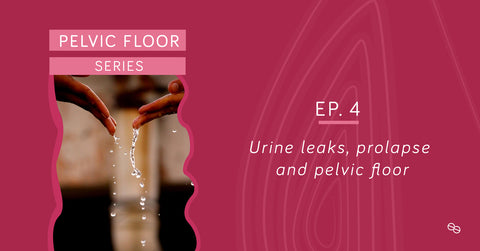Urine Leaks, Prolapse and Pelvic Floor
Welcome to a new episode of our “Pelvic Floor and Where To Find It” series! Today we are discussing incontinence and prolapse.

Index:
Incontinence is not just about urine
How is incontinence linked to our pelvic floor?
Incontinence has no age
Kegel exercises to treat urine leaks
Curious facts on urine leaks
What about prolapses?
Do you have symptoms when having a prolapse?
Can you experience a prolapse at any age?
Treatments of pelvic organs prolapse?
Post surgery incontinence or prolapse?
Take outs of episode four
What's the next episode about?

No, don’t skip. We tend to associate leaks with menopause (and beyond) or, perhaps, with pregnancy (spoiler: not accurate!) as well as with the idea that it is normal (and ok) to have urine leaks when aging or pregnant (also, not true). A similar approach is applied to prolapses.
“We are like a tap; we are made to stay closed and not leaking” - said Anna. If your tap leaks, you fix it, right?
Incontinence is not just about urine
Let’s begin by saying no matter if it is just one drop once in a while or you simply can’t hold pee at all, even one drop is incontinence. Going back to Anna’s tap example, we shouldn’t leak at all, not even during pregnancy when there is so much pressure in our abdominal area. Moreover, we can experience incontinence with urine but also poop and air. There are different types of incontinence, but generally it happens when you are not able to hold any of your sphincters closed and involuntarily you release urine, poop or air.
Urine leaks are classified into different types, but main ones are: stress incontinence and urge incontinence.
Stress incontinence happens when you occasionally have leaks when coughing, sneezing, laughing, exercising or lifting something heavy. As we said earlier, even one drop is already classified as incontinence.
Urge incontinence instead is when you have a sudden, intense urge to urinate followed by an involuntary loss of urine. You may need to urinate often. You may also experience it when you are close to the toilet; you have spent the whole day outside not thinking about having to pee but when you are at your front door, you just can’t hold it any more and it’s very urgent to reach the toilet. Or when you are just in front of the toilet.
There are situations where you have stress and urge leaks, as well as we have to be sure urgency is not caused by a UTI.

When it comes to poop - of course diarrhea excluded - it happens when you are not able to control it, even if it’s just a little bit of mucus. If for example you are not able to hold it and when you feel the stimulus you have to find a toilet or you'll just do it. As well as with air; it is totally normal to have air in your tummy and you should expel it. Incontinence happens when, beside you trying to hold it with all your muscles, it just gets out.
How is incontinence linked to our pelvic floor?
We have mentioned many times now that one function of our pelvic floor muscles is to hold our abdominal organs; the intestine and urethra are surrounded by a portion of the pelvic floor, which helps us keep the gate closed or open. If our pelvic floor tone is not right, no matter if too tonic or loose, it won’t be able to be flexible enough to control the “gates” and we’ll experience incontinence.
A common thought is that leaks are linked to hypotonic pelvic floor, but that’s not always the case! Even if our muscles are already too contracted, they won’t be able to relax or contract and regulate any flow properly.
Constipation can also be linked to the pelvic floor and most of the time is due to a wrong position when sitting on the toilet causing a contraction of the muscles. (We’ll dedicate a full section to how to learn to poop in the correct position!).
Unless you are experiencing incontinence due to a neurological issue, you’ll be able to fix it at any age. We tend to believe that since many womxn experience leaks at some point in their lives, this is ok and we should just accept it. 1 million womxn have incontinence. Guess what? That’s not ok. And - no matter your age - you deserve a healthy life even when it comes to your intimate parts.

Incontinence has no age
Leaks can be experienced from a very young age, especially stress incontinence if, for example, you train a lot and your pelvic floor is hypertonic.
During pregnancy or after delivery, one third of new mums deals with urine leaks when lifting the baby or laughing/sneezing. During and after menopause is quite common to have urges incontinence; most of the time it is the consequence of not having taken care of your pelvic floor at all before reaching that age. It can also be caused by physiological/hormonal change.
________________________________________________________________
You may also like: Period-proof Underwear: Advance Lingerie with Cocoro
________________________________________________________________
Kegel exercises to treat urine leaks
We’ll discuss kegel exercises in depth in the episode dedicated to pelvic floor rehabilitation, but let’s just say they were created in the 19th century; today we have quite smart devices to be used as kegel trainers. The issue with urine leaks and kegel training lies in the common mistake that if you have incontinence it must be due to loose muscles that need to be trained and reinforced. That’s not always the case; so we strongly recommend to see a pelvic floor expert, have your pelvic area checked, and then - if agreed - start also doing kegel exercises as part of your training.
Curious facts on urine leaks
How much your drink is not linked to incontinence; however, coffee should be avoided if you suffer from leaks!

What about prolapses?
When our pelvic floor doesn’t work well, we might experience a fall of the organs it is supposed to hold up: womb, bladder or intestine. There are different levels of prolapses and it may involve more than one organ at the same time. You might have heard of anterior (bladder involved), uterine (womb) or posterior prolapse (intestine lies down towards the vagina).
If you have a “level 0” it means there is no prolapse. Depending on how far the prolapse is, how visible are the organs falling down, you can go through levels 1,2,3,4. Level 3 or 4 will need surgery to get fixed as the organs will mostly fall outside.
Do you have symptoms when having a prolapse?
It depends on the organ involved in the prolapse. Sometimes it gives no symptoms at all like when the bladder is involved. Most common symptoms are:
- a feeling of heaviness around your lower tummy and genitals
- a dragging discomfort inside your vagina
- feeling like there's something coming down into your vagina – it may feel like sitting on a small ball
- feeling or seeing a bulge or lump in or coming out of your vagina.

Can you experience a prolapse at any age?
Yes, even in your twenties you can suffer from prolapses.
For example, if you train a lot or you are a professional athlete and you have never taken care of your pelvic floor there might be the chance your tone is not right.
Several pregnancies in a short timeframe or damages during delivery can cause prolapses.
If your job is to lift heavy stuff or if you have anal sex frequently you might experience it as well.
Speaking of anal sex, if you do it frequently, you should check your pelvic floor more often. Also, if you experience discomfort, if dimensions of what is inserted are too big, you should be aware you might be damaging your pelvic floor.
Treatments of pelvic organs prolapse?
It depends on the level (as we said 3 and 4 require surgery); level 1 and 2 are usually totally treatable. The rehabilitation depends on the status on that pelvic floor hypotone, but there might be also areas that are hypertonic.
If, for any reason, the person with a level 3 or 4 doesn’t want the surgery, pessaries are very useful tools to control the prolapse and place the organs back into place. There are disposable or reusable pessaries that the person can use just inserting them into the vaginal canal during the day to hold up the organs and then take it out at night. Of course, pelvic floor rehabilitation is mandatory when experiencing severe prolapses.
Post surgery incontinence or prolapse?
Guidelines for any gynecological surgery implies the evaluation and rehabilitation of the pelvic floor before and after the surgery; that will help the person to avoid side effects. Sadly, this is not well done all the time and womxn are sometimes left alone with incontinence or prolapses after surgeries like hysterectomy. If that’s your case, even if it’s been a long time ago, go have your pelvic floor checked! You might still be able to solve it.
Delivery is also another delicate moment for our pelvic floor and an evaluation/rehabilitation of the pelvic floor should be done right at the beginning of the pregnancy and postpartum, especially if it is the case of a C-section or an active delivery with episiotomy or any other injury.

Take outs episode four
Incontinence and pelvic organ prolapse can happen at any age, but they are treatable most of the time.
Leaks do not involve only urine; you might also experience poop or air leaks.
Even one drop of urine is incontinence, at any age and in any status (even if you are pregnant).
Kegel exercises are not always recommended for urine leaks.
Incontinence is not always caused by a hypotonic pelvic floor.
Pelvic organ prolapse can happen to everyone, men and womxn; there are 4 levels, the two latest (3 and 4) will need surgery to be fixed or/and the use of devices as pessaries to support the organs.
You might have no symptoms but still have a prolapse.
If you have anal sex frequently, you should check your pelvic floor more often.
What's the next episode about?
In the next episode Virginia and Anna will discuss lifestyle changes to be aware of your pelvic floor and avoid damaging it. Tips, tricks and practical advice on actions we do everyday without considering their potential impact on the pelvic area.

